The state of AI at work in 2024: What customer service/sales employees really think


Tags
Share
In the face of a rapidly changing landscape of work and technology, generative AI technology like ChatGPT and Google Vertex has been a disruptive force that's brought about a dramatic cultural shift. Companies that weren’t previously using AI at work are now more open to using AI tools, but have we crossed the chasm yet? This report will explore the impact of AI on the workplace and the implications it has for the future of work and technology.
Executive summary
AI has revolutionized the way we work. This report provides an in-depth analysis of the current state of AI adoption and perceptions among professionals in various industries. McKinsey & Company discovered that generative AI will have a major impact on customer operations and sales, so this report concentrates on customer service and sales roles.
The key findings reveal valuable insights into the adoption rates, perceived benefits, barriers, and attitudes toward AI in the workplace. By understanding these trends, businesses can gain valuable insights into the current landscape of AI adoption and make informed decisions about implementing AI technologies in their own organizations.
For example, customer service/sales managers, directors, and VPs are more likely to embrace AI compared to individual contributors, possibly due to their decision-making authority and responsibility for driving productivity and innovation. The benefits of AI on both a company and individual level, such as efficiency, customer insights, and a reduction in "busy work," are widely recognized.
However, lack of budget poses a significant obstacle to widespread AI adoption. Despite this, the overall perception of AI is positive, with the majority of respondents (79%) believing in its positive impact on their performance at work.
The report highlights the importance of addressing barriers, developing ethical guidelines, and enhancing accessibility to unlock the full potential of AI in various sectors.
About the survey
Respondents: 1,102 customer service/sales professionals in the U.S.
Role: Various levels (agent/rep, manager, director, VP, C-suite)
Company size: <50 to 1000+
Date: May 8-22, 2023
Key findings
ChatGPT is a gateway AI.
76% of individuals that previously didn’t use AI will now consider it after using ChatGPT.
Respondents aren’t scared about AI stealing their job.
70% of sales and customer service professionals say they don’t fear AI will steal their job one day.
Most companies don’t have an AI policy.
84% of respondents said their company does not have a company-wide AI policy.
Small businesses are most skeptical about using AI.
30% of companies with less than 50 employees are skeptical of AI tools, compared to 14% at companies with 51-100 employees, and 20% at companies with 100+ employees.
Those using AI are seeing the benefits.
79% of sales and customer service professionals using AI tools at work have experienced a positive impact on their performance at work.
Lack of budget is the biggest inhibitor of AI adoption.
37% of respondents said lack of budget was the reason AI tools aren’t being used at work.
What does AI adoption look like so far?
Managers are more likely to adopt AI than individual contributors
Turns out, managers like AI.
Although general AI adoption is still low (49% of all respondents surveyed aren’t planning to use AI in their work), respondents in manager, director, and VP roles are much more inclined to embrace AI compared to individual contributors.
This could be for a few reasons. For one thing, managers generally have a degree of decision-making authority within their organization, and therefore have a broader perspective on the benefits and potential of AI in improving business operations.
Similarly, directors and VPs are responsible for driving productivity, efficiency, and innovation, and AI offers tools and technologies that can help them achieve these goals. These roles also have access to budgetary resources and can make decisions regarding technology adoption, making it easier for them to implement AI initiatives within their teams.

Despite being in the early stages of AI adoption, a large majority of sales managers and above (84%) believe that AI tools can positively impact their company's sales. 79% of customer service managers and above believe that AI positively impacts their company's key metrics. As these are crucial top-line and bottom-line areas for any business, these managers may look to invest in AI further to become more efficient, sell more, or service better in the future.
Increased efficiency is a top driver on a company level
The top three benefits respondents expect from AI on a company level are efficiency (43%), customer insights (39%), and a competitive advantage (30%).
Efficiency is a critical factor for businesses looking to optimize their operations and streamline processes. By using AI algorithms and automation, companies can enhance productivity, reduce manual labor, and accomplish tasks faster and more accurately. This increased efficiency not only saves time and resources but also enables organizations to allocate their workforce effectively, enabling them to focus on more strategic initiatives.

Reducing “busy work” is a top driver on an individual level
The top two benefits respondents expect from AI on an individual level are a reduction of “busy work” (47%) and the ability to learn and work faster (39%).
The concept of "busy work" refers to repetitive, low-value tasks that consume time and energy without contributing to personal growth or overall productivity. By leveraging AI, individuals can automate these tasks, letting them focus on more complex ones, like those that require creativity, critical thinking, and problem-solving.
AI-powered tools and platforms can also help facilitate faster learning and work processes, empowering individuals to learn new skills, access relevant information, and accomplish tasks more efficiently, ultimately driving their professional growth and performance.

The biggest deterrent from AI adoption is lack of budget
Contrary to a common misconception, the primary reason why AI tools are not being widely used in the workplace is the lack of budget—not a lack of trust or belief in their usefulness.
According to the survey, 37% of respondents identified the lack of budget as the number-one barrier to adopting AI tools at work. This finding highlights the financial constraints faced by organizations when it comes to investing in and implementing AI technologies, despite the growing recognition of the potential benefits AI can bring. As companies better understand the benefits of AI, we expect this to change in the future.

How do people feel about the impact of AI?
Despite the low adoption rate (49%), the perception of AI is quite positive, with 79% of respondents believing AI tools will have a positive impact on their performance at work.
This positive perception extends across various professional domains. For example, 84% of sales professionals believe that AI tools positively contribute to their company's sales efforts, highlighting the potential of AI to enhance sales strategies and outcomes. And 76% of customer service professionals recognize the positive impact of AI tools on their company's key metrics, emphasizing their role in improving customer service experiences.
Interestingly, the fear of AI job displacement is not as prevalent as one might think. Around 70% of respondents don’t fear that AI will steal their job, suggesting a level of trust and understanding that AI technologies are designed to augment rather than replace human roles. And approximately 20% of respondents don’t believe that AI will change their role, indicating confidence in the stability and longevity of their current job functions.

Overall, these findings reflect a positive sentiment toward AI and its potential to positively impact performance and job outcomes across various professional fields.
How do people feel about the ethics of AI?
The ethics of AI is a subject that evokes mixed responses among respondents. While nearly a quarter of respondents (24%) believe that AI is not ethical, there is a lack of company-wide AI policies in place to address these concerns. Surprisingly, 84% of respondents stated that their company does not have a company-wide AI policy.
When specifically considering those who are already using AI at work, 55% of those companies still lack a standard policy governing AI usage. This highlights the need for organizations to prioritize creating clear ethical guidelines to make sure AI is being used responsibly.
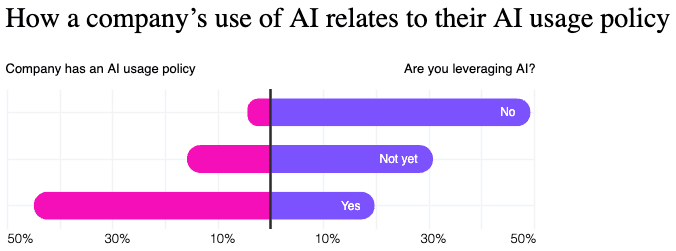
Opinions are also divided when it comes to the accessibility of AI. 51% of respondents believe that AI is accessible, while the remaining 49% do not believe it’s accessible. This indicates the existence of barriers or challenges that limit the widespread adoption and usability of AI. But we may see this change quickly as more and more companies (including Google) begin to offer generative AI.
As AI continues to advance and permeate various aspects of society, it becomes more and more important to address ethical concerns, develop robust policies, and improve accessibility to ensure that AI is deployed in a responsible, fair, and inclusive manner.
How do different industries perceive AI?
Some sectors are leading the way for AI adoption while others still aren’t totally on board. The top five industries embracing AI on a company level are computer software, entertainment, chemical/pharmaceutical, defense, and insurance. These industries recognize the potential benefits of AI and have actively integrated AI technologies into their customer service/sales operations.
AI adoption by industry

On the other hand, there are industries that have yet to fully leverage AI, including food, manufacturing, hospitality/travel, education, and public service. However, there are indications of change on the horizon.

Interestingly, representatives from the chemical/pharmaceutical industry express the highest level of concern (71%) about AI job displacement compared to other sectors. The media industry stands out as perceiving AI as not being ethical more than any other industry.
Given that a significant portion of respondents believe AI can provide a competitive advantage (30%), industries currently lagging in AI adoption, including food, education, and manufacturing, stand to benefit from embracing AI at work.
AI adoption by CSAT
According to Dialpad data for the average Ai CSAT scores across different industries, the industries with high customer satisfaction ratings include home services, construction, utilities, and industrial sectors. On the other hand, industries such as pharmaceutical, insurance, legal, and automotive have lower CSAT ratings, indicating room for improvement through AI adoption:
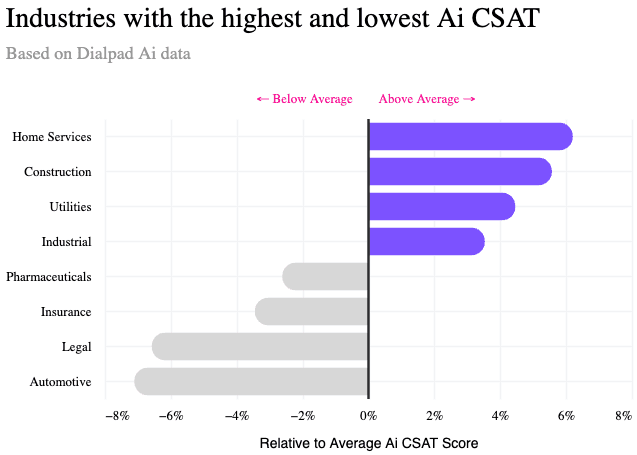
What's Ai CSAT?
One of the biggest challenges with collecting CSAT scores is that not a lot of people actually fill out those surveys.
In fact (depending on the industry and specific business of course), we've found that on average only about 5% of customers actually fill out CSAT surveys. On a related note, usually only the angriest—and happiest—customers actually bother to respond to these surveys, which means your CSAT answers are likely to be very skewed and not representative of how your customers feel overall.
Dialpad's industry-first Ai CSAT feature is designed to solve exactly that by inferring CSAT scores for 100% of your customer calls. The result? A much more representative sample size for CSAT scores, and a more accurate understanding of how satisfied your customers really are:
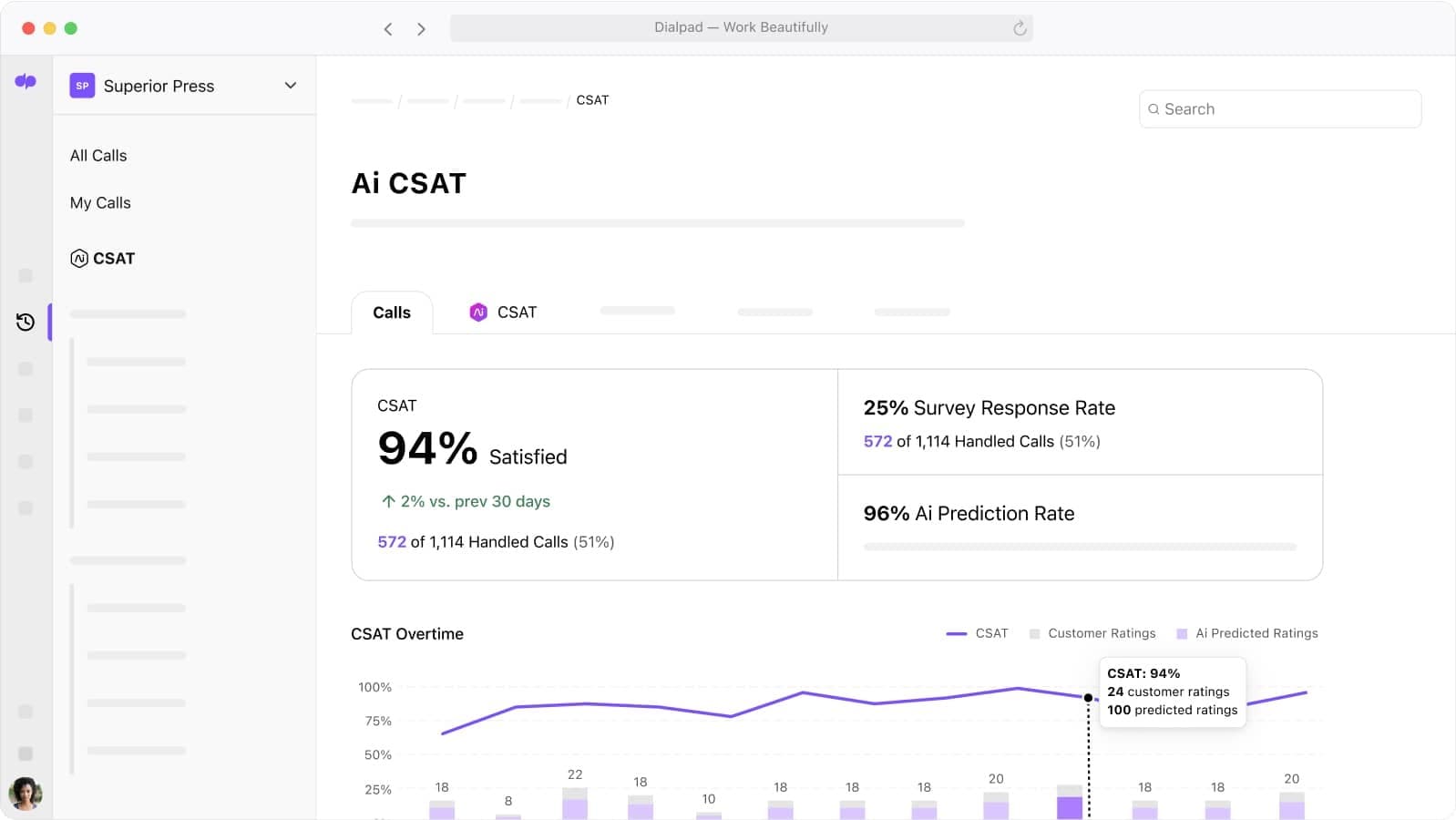
How does a company’s annual revenue affect its perception of AI?
The survey also found that perceptions of AI vary based on the annual revenue of companies. Larger companies with over $100M in revenue are more inclined to invest in AI tools within the next five years compared to smaller companies. In fact, for companies with over $500M in revenue, almost half of the respondents (49%) express optimism that AI will enhance the agent experience.
Conversely, companies with less than $100M in revenue tend to exhibit more skepticism towards adopting AI tools, with 28% expressing reservations compared to 19% among companies with higher revenues. This skepticism is further reflected in the belief that over half (52%) of respondents from companies with less than $100M in revenue perceive AI as inaccessible in its current state.
These findings underscore the importance of addressing barriers and enhancing accessibility to AI technologies, particularly for smaller companies, in order to promote wider adoption and harness the full potential of AI across the business landscape.
How do small companies perceive AI versus larger organizations?
Small businesses tend to exhibit more skepticism towards AI adoption, with budget constraints as a main barrier. Similarly, larger companies with 1000+ employees face additional challenges and barriers that make AI adoption less likely. In fact, 55% of companies with fewer than 50 employees and those with 1000+ employees are not using AI tools and have no plans to do so. This may be because AI is often perceived as something that's costly to use and maintain. However, more and more tools are making AI both accessible and cost-effective.
While skepticism towards AI tools is present across all company sizes, the highest level of skepticism comes from companies with less than 50 employees—with over 30% expressing doubts.

Employees at mid-size companies (100-1000 employees), companies with over $100M in revenue, and industries such as computer software, information, and entertainment demonstrate a positive outlook towards AI. For example, 80% of companies with 101-1,000 employees agree that AI has a positive impact on their work, with 91% believing it will positively impact their sales.
Additionally, the usage of AI tools varies across company sizes, with enterprises utilizing conversational AI the most. These insights highlight the nuanced perceptions of AI across different company sizes and shed light on the factors influencing AI adoption and skepticism.
For example, Dialpad’s omnichannel contact center platform has built-in conversational AI (along with other unique AI solutions) that can optimize workflows and even spot gaps in training materials and knowledge databases, and even make recommendations that a company add more information there to handle customer questions.

Customer Service vs. Sales: Who uses AI more?
When it comes to the usage of AI, customer service and sales professionals show some differences in their adoption and perceptions. Among the survey respondents, 52% were customer service professionals and 48% work in sales.
Currently, AI is primarily used during conversations rather than before or after interactions, suggesting a potential lack of awareness regarding the broader use cases of AI in both customer service and sales roles.
In customer service, AI is commonly used when supporting customers (30%) and during onboarding processes (15%). In sales, AI is used during sales conversations (23%) and prospecting (22%). When comparing the two roles, customer service professionals exhibit slightly lower likelihood to invest in AI tools at work compared to sales professionals.
At the same time, sales professionals show slightly higher skepticism (28%) towards AI tools compared to customer service reps (25%). More customer service professionals rely on AI insights and analytics gathering tools, while a greater percentage of individuals in sales believe that AI will positively impact their performance at work (82% vs. 78%).
Panel vs. Dialpad customers: Who’s most likely to adopt AI?
When comparing panel and Dialpad customers, Dialpad customers are more likely to adopt and invest in AI. Out of the 1,102 respondents, approximately 8% (90 respondents) were Dialpad customers. Among these customers, a significant majority, 93%, believe that AI tools have a positive impact on their company's sales.
79% of Dialpad customers perceive that the use of AI tools can influence their company's key metrics. The adoption of generative AI for better decision-making also resonates strongly with Dialpad customers, with 73% expressing this belief, compared to 47% among all survey respondents.
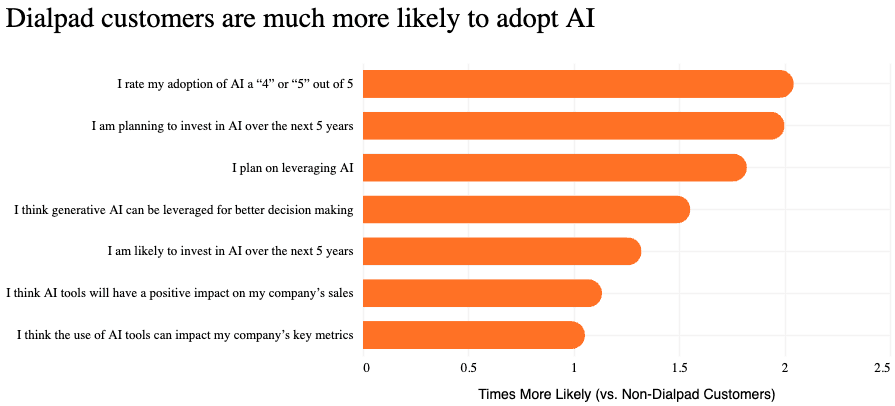
Dialpad customers are notably more inclined to invest in AI over the next five years, scoring 3.7 on a scale of 1 to 5, while non-Dialpad customers score 2.8. And over 60% of Dialpad customers plan to invest in AI in the coming years, compared to 30% of non-Dialpad customers.
The survey findings also indicate a high level of AI adoption among Dialpad customers, as almost half (47%) rate their AI adoption as a "4" or "5" out of 5. Only a small percentage, 14.4%, of Dialpad customers do not have plans to leverage AI.
These statistics highlight that Dialpad customers are more likely to embrace AI, recognizing its positive impact on their company's performance and showing a strong inclination to invest in AI technologies in the future.
Conclusion
Although ChatGPT has helped normalize the usage of AI at work, we still haven’t crossed the chasm yet. While individuals recognize the benefits of AI, we still have a ways to go before AI is widely adopted across organizations of all sizes.
Budget constraints remain a significant hurdle, with lack of financial resources being the primary reason for non-adoption. Over time, however, we expect to see an increase in AI budgets as organizations recognize the tangible value and competitive advantage it can provide.
There are also concerns around ethics, accessibility, and the fear of AI replacing human jobs that continue to impede progress. While customer service and sales managers are more likely to embrace AI compared to individual contributors, it’s crucial to educate individual contributors to alleviate their concerns and ensure a smooth transition towards AI integration.
Looking towards the future, it’s evident that AI will continue to evolve and become an increasing part of the way we work. As AI technologies advance, organizations will need to stay updated and adapt to the changing landscape to remain competitive. Understanding the potential of AI in enhancing efficiency, providing customer insights, and gaining a competitive advantage will be crucial for organizations to thrive in the digital era.
As an AI-powered customer intelligence platform and a leader in the AI space, Dialpad can help organizations overcome barriers and unlock the full potential of AI adoption. Dialpad Ai can offer advanced analytics, real-time customer insights, and automation tools that can empower businesses to deliver exceptional customer experiences and drive sales performance.
Methodology
Dialpad conducted an online survey about AI at work through Qualtrics from May 8-22, 2023. A total of 1,102 customer service and sales professionals in the U.S. were surveyed across various levels and industries. This includes 1,012 responses from an anonymous panel and 90 Dialpad customers, with a confidence interval of 90-95%.
Appendix
Here’s a snapshot of the survey’s demographics, including annual revenue, company size, and job titles:
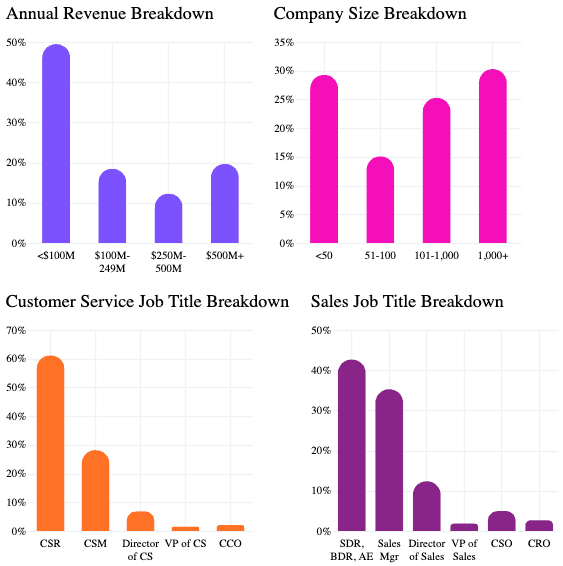
About Dialpad
The industry leader in AI-powered conversational intelligence, Dialpad delivers everything you need to handle business and customer communications in one beautifully designed platform. Over 30,000 businesses and millions of people worldwide are using Dialpad to unlock real-time insights and provide live automated coaching with Dialpad Ai, a state-of-the-art artificial intelligence, which has analyzed over 4 billion minutes of proprietary voice and messaging data.
Integrate AI into your workflow
Let our team show you how Dialpad Ai can help your sales and customer support teams work more productively. Or, take a self-guided interactive tour of the app first!









